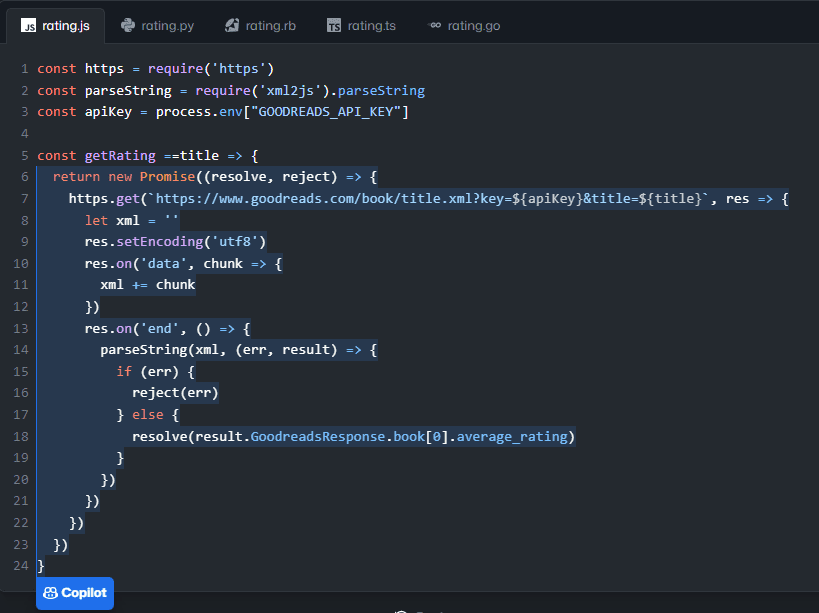Many wonder whether GitHub Copilot and ChatGPT are alike because they use OpenAI’s GPT technology but serve entirely different purposes.
GitHub Copilot and ChatGPT are both AI technology that takes in input from users and generates relevant responses. But, GitHub is solely designed to solve programming tasks, while the latter is a generic-purpose tool.
You heard it right! These two are entirely different platforms with many shared abilities.
Continue reading the article to learn the differences and similarities between GitHub Copilot and ChatGPT.
GitHub Copilot Vs. ChatGPT: Similarities And Differences
ChatGPT and GitHub Copilot have made their names despite the rising technology war between the two.
With millions of daily users and professional applications, they are proving to be game-changing technologies.
However, many users, especially coders, confuse one with the other because they both provide valuable responses for programming.
Nonetheless, here is what you need to know about GitHub Copilot and ChatGPT.
What Is ChatGPT? How Does It Work?
ChatGPT is a robust language model or chatbot developed by OpenAI Lab, based on the GPT (Generative Pre-trained Transformer) architecture.
You can access it through the web interface or integrate its API into your web or application to use commercially.
ChatGPT is more like an AI assistant where you can ask for suggestions on your code, for example, optimization, and it comes up with a prompt solution. An example of ChatGPT creating HTML boilerplate for a website.
Some other significant applications of ChatGPT include language translation, coding and debugging, content generation, text completion, and conversation.
- The Chatbot model uses deep learning algorithms to analyze and understand text input to generate human-like responses for various subjects.
- Powered by GPT-3 model, it is trained on a vast corpus of text data and boasts 175 billion parameters to generate the most accurate, coherent, and contextually appropriate responses.
- Its ability to generate quick responses has made it a valuable tool for various applications, including language translation, content generation, and conversational AI.
Continue reading to learn about ChatGPT’s best uses.
What is GitHub Copilot? How Does it Work?
GitHub Copilot is a code generation tool developed by the collaboration of GitHub and OpenAI.
It works as a plug-in for Visual Studio Code (a popular integrated development environment used by many developers).
GitHub Copilot uses OpenAI’s GPT-3 architecture to generate code suggestions based on the context and the user’s code.
Therefore, it can analyze the code in real-time and suggest relevant code snippets or even entire programming functions.

It comes very handy when using it from the start of the project, such as quickly filling up functions, assigning variable names, creating algorithms for sorting and selecting, etc.
Here is how you can use GitHub Copilot for various coding purposes.
- Writing Boilerplate Code: It helps generate templates for everyday tasks, such as setting up a new project, creating a database connection, or defining a class structure.
- Debugging: It helps suggest solutions to common coding errors or exceptions, such as undefined variables.
- Writing Tests: It helps generate test cases and assertions for any function or module.
- Completing Code Snippets: It helps complete the code snippet based on the code’s context and your requirement.
Like ChatGPT, it can automate repetitive or time-consuming tasks that would slow down the developer.
Remember, GitHub Copilot is not a replacement for developers but a tool to help them write code more efficiently.
ChatGPT Vs. GitHub Copilot: How Are They Similar?
ChatGPT and GitHub Copilot use a modified version of the GPT 3 model, so technically, they are equal in performance.
Therefore, there are some similarities between these two technologies.
| Similarities | Specification |
|---|---|
| OpenAI | Both ChatGPT and GitHub Copilot are developed by OpenAI, a research organization. |
| Language Modeling | Both technologies are based on natural language modeling (NLP). It uses statistical models to understand and generate human language. |
| Machine Learning | They use machine learning techniques to improve their performance. ChatGPT is pre-trained on a large corpus of text data. GitHub Copilot is trained on code repositories and learns from developer input. |
| Contextual Understanding | They use contextual understanding to generate responses. ChatGPT decodes the context of a conversation to generate relevant responses. GitHub Copilot identifies the programming language and libraries to generate appropriate code suggestions. |
| Adaptive Learning | They are capable of adaptive learning and learn from user input to adjust their responses accordingly. ChatGPT can improve its performance on specific tasks through fine-tuning. GitHub can learn from developer feedback to improve its code suggestions. |
| Integration | Both technologies can be integrated into existing software platforms. ChatGPT can be used in chatbots and virtual assistants. GitHub Copilot can be used as a plug-in for Visual Studio Code. |
In fact, both ChatGPT and GitHub Copilot help programmers with various aspects of coding.
Watch the video to check out a battle between the two technologies,
ChatGPT Vs. GitHub Copilot: Major Differences
Although ChatGPT and Copilot share the same technology, the critical difference is the models these two AIs train on.
Here are some major differences between them.
1. Their Purpose
ChatGPT is designed for natural language processing tasks such as language translation, text completion, and conversational AI.
On the other hand, GitHub Copilot is designed for code generation and completion, writing boilerplates and assisting with various complex tasks.
Additionally, Copilot uses all the endless resources found on GitHub and is designed to write codes, while ChatGPT is trained to respond to various inputs resembling natural language.
2. Costing
The basic version of ChatGPT is free to use and does not require signing up for a free trial.
The premium version ChatGPT Plus costs $20 monthly and offers unlimited Chatbot access, zero downtime, and quicker responses.

On the other hand, GitHub Copilot is a paid service that provides a free trial upon sign-up for individuals.
The Copilot for individuals costs $10 per month/$ 100 per year. Meanwhile, the Copilot for Business costs $19 per user a month.

3. Training
ChatGPT is trained on a large corpus of text data obtained from websites, directories, blogs, books, newspapers, magazines, etc.
GitHub Copilot, a code generation tool, is trained on code repositories and developer input, mainly obtained from GitHub.
ChatGPT’s training data helps it understand and generate natural language, while Copilot’s data helps identify and suggest relevant code snippets.
4. Response Output
ChatGPT generates natural language responses based on the input it receives.
While GitHub Copilot generates code snippets based on the programming language, libraries, and frameworks used.
Similarly, ChatGPT’s output is designed to mimic human language, and Copilot’s production is intended to be executable code.
5. Integration of Technology
ChatGPT can be integrated into various software platforms, including chatbots, virtual assistants, and customer service applications using the API.
On the other hand, Copilot is specifically designed as a plug-in for Visual Studio Code.
Watch the video to learn how GitHub Copilot actually works,
6. Language Support
ChatGPT supports a wide range of languages and generates natural language responses in multiple languages (English, Mandarin, and programming languages).
However, GitHub Copilot only supports a more limited set of programming languages, such as Python, JavaScript, TypeScript, Ruby, and Go.
7. User Interaction
ChatGPT is designed as a Chatbot and engages in natural language conversations with users by generating responses to questions and providing recommendations.
Meanwhile, GitHub Copilot is not a Chatbot. It generates code suggestions based on the context of the code being used.
8. Technology Applications
You can use ChatGPT for various natural language tasks, such as language translation, Chatbots, and content creation, including articles, blogs, emails, letters, etc.
On the other hand, GitHub Copilot helps with code auto-completion and generation.
Additionally, it helps improve developer productivity by reducing time spent creating custom codes.
Final Thoughts
In summary, GitHub Copilot acts as a specialized tool for code auto-completion and generation.
Meanwhile, ChatGPT performs a more general language model function for various natural language tasks.
However, both technologies are limitless regarding resources and broader daily applications.
With new versions for both services rolling out soon, users can expect to get better, improved, and more accurate responses.
Frequently Asked Questions
Does GitHub Copilot Have API To Developers?
Yes, GitHub Copilot has an API that developers can use to integrate the tool into their applications called the GitHub Copilot for Visual Studio Code API.
With the Copilot engine, developers can incorporate code autocompletion and generation capabilities into their applications or tools.
Does ChatGPT Offer An API To Developers?
Yes, OpenAI offers an API for developers to access the ChatGPT language model.
Developers can use it to build applications incorporating natural language processing, such as chatbots, language translation tools, and content creation tools.








1 thought on “Github Copilot Vs. ChatGPT: Similarities And Differences”